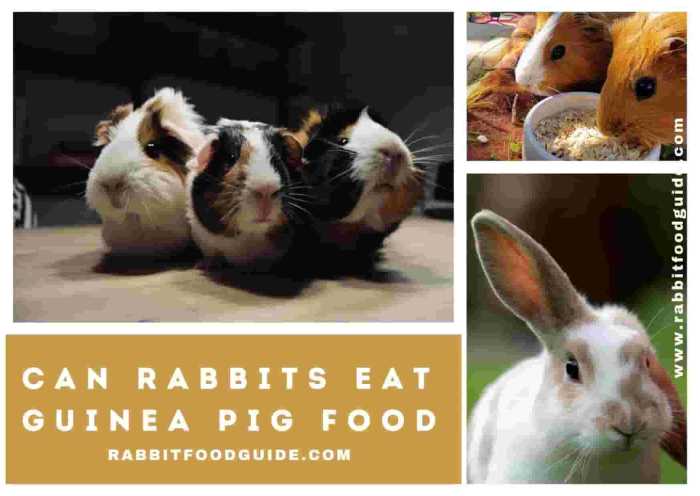Rabbits and guinea pigs are both popular small pets, and they share some similarities in their diets. However, there are also some important differences to be aware of. In this article, we’ll take a closer look at the dietary needs of rabbits and guinea pigs, and we’ll discuss which foods they can and cannot eat.
Rabbits are herbivores, which means that their diet consists primarily of plants. They need a diet that is high in fiber and low in protein and fat. Guinea pigs are also herbivores, but they have a more specialized diet than rabbits.
They need a diet that is high in vitamin C and low in calcium.
Dietary Needs of Rabbits and Guinea Pigs

Rabbits and guinea pigs are both herbivores, but they have different nutritional needs. Rabbits require a diet that is high in fiber and low in protein, while guinea pigs need a diet that is high in vitamin C and low in calcium.
Rabbit Dietary Needs
Rabbits are hindgut fermenters, which means that they have a large cecum where bacteria ferment their food. This process produces volatile fatty acids, which are an important source of energy for rabbits. Rabbits also need a high intake of fiber to maintain a healthy digestive system.
Fiber helps to keep the cecum functioning properly and prevents the development of digestive problems, such as bloat.
In addition to fiber, rabbits also need a moderate amount of protein. Protein is essential for growth, repair, and reproduction. Rabbits should get about 12-16% of their diet from protein.
Guinea Pig Dietary Needs
Guinea pigs are also hindgut fermenters, but they have a smaller cecum than rabbits. This means that they are not able to ferment as much fiber as rabbits. Guinea pigs also need a higher intake of vitamin C than rabbits.
Vitamin C is essential for the production of collagen, which is a protein that is found in the skin, bones, and teeth. Guinea pigs should get about 10-15 mg of vitamin C per day.
In addition to vitamin C, guinea pigs also need a moderate amount of protein. Protein is essential for growth, repair, and reproduction. Guinea pigs should get about 15-20% of their diet from protein.
Similarities and Differences in Digestive Systems
Rabbits and guinea pigs have similar digestive systems, but there are some key differences. Rabbits have a larger cecum than guinea pigs, which allows them to ferment more fiber. Guinea pigs also have a higher requirement for vitamin C than rabbits.
Types of Food
Rabbits and guinea pigs share similar dietary needs but have specific preferences and requirements. Providing a balanced diet that meets their nutritional needs is essential for their health and well-being.
Vegetables
Both rabbits and guinea pigs can enjoy a variety of fresh vegetables as part of their daily diet. Some safe and nutritious options include:*
-*Leafy greens
Kale, romaine lettuce, spinach, parsley, cilantro
-
-*Cruciferous vegetables
Broccoli, cauliflower, Brussels sprouts
-*Root vegetables
Carrots, parsnips, turnips
-*Peppers
Bell peppers (green, red, yellow)
-*Herbs
Basil, mint, oregano
Fruits
Fruits can be offered occasionally as treats, but they should be limited due to their high sugar content. Some fruits that can be fed to both rabbits and guinea pigs include:* Apples
- Bananas
- Berries (strawberries, blueberries, raspberries)
- Grapes
- Pears
Hay
Hay is an essential part of a rabbit’s and guinea pig’s diet. It provides fiber, which is crucial for their digestive system. Different types of hay are suitable for each species:| Hay Type | Rabbits | Guinea Pigs ||—|—|—|| Timothy hay | Excellent | Good || Orchard grass hay | Good | Excellent || Alfalfa hay | Limited | Unlimited |Alfalfa hay is high in protein and calcium, making it unsuitable for rabbits as a primary hay source.
However, it can be offered occasionally to young, growing rabbits or pregnant or nursing does. Guinea pigs, on the other hand, can eat alfalfa hay freely.
Foods to Avoid
Rabbits and guinea pigs share many dietary needs, but there are certain foods that can be toxic or harmful to one or both species.
It is important to avoid these foods to ensure the health and well-being of your pets.
Vegetables Toxic to Rabbits
- Avocado
- Broccoli
- Cabbage
- Cauliflower
- Celery
- Kale
- Spinach
Fruits that should not be fed to Guinea Pigs
- Apple seeds
- Apricot pits
- Avocado
- Cherries
- Grapes
- Peaches
- Pears
Table of Foods to Avoid for Both Rabbits and Guinea Pigs
| Food | Reason |
|---|---|
| Chocolate | Contains theobromine, which is toxic to both rabbits and guinea pigs |
| Dairy products | Can cause digestive upset and diarrhea |
| Meat | Rabbits and guinea pigs are herbivores and cannot digest meat |
| Onions | Can cause anemia and other health problems |
| Potatoes | Contain solanine, which is toxic to both rabbits and guinea pigs |
| Rhubarb | Contains oxalic acid, which can be toxic to both rabbits and guinea pigs |